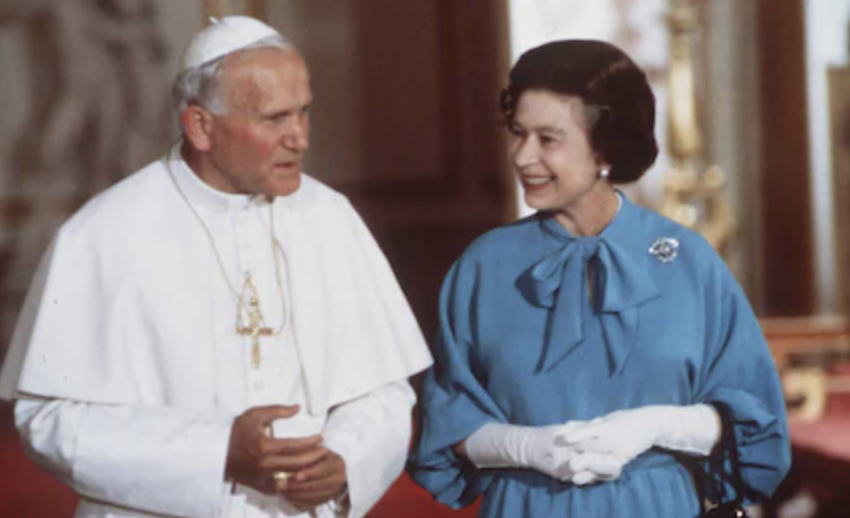Upon hearing the news that Queen Elizabeth II passed on to glory on September 8, I knew it would take me a while to gather my thoughts. There was a degree of lament, sadness, and uncertainty, but I couldn’t quite figure out why.
And now the period of national mourning in the United Kingdom is over, and the reign of King Charles III is well underway.
I’ve read numerous columns from writers explaining their own perspective on why the death of the Queen has gripped the UK, and frankly, the whole of the earth, in such a dramatic manner. And I think I’ve finally been able to figure out why.
Many rightly point to her sense of duty, grace, determination, and charming sense of humor. But that never captured how I viewed the passing of the Queen.
The Queen was the last of a true Christendom, and a true Christian monarch.
My 11-times great-grandfather, Thomas Holcomb, was an English Puritan. Many accept that he was born in 1605, but some historians and genealogists contend that he was born 10 years earlier in 1595. If we proceed with the assumption he was born at the earlier date, he was born at the very tail end of the first Elizabethan age. Now here I’ve witnessed the end of the second.
Elizabeth II’s first prime minister was Churchill himself, the great lion that led the British Isles against all of occupied Europe. Elizabeth was but a child when she watched her father, King George VI, work with Churchill in guiding the British people through a second devastating war in less than a generation. She herself served in the British war effort.
Many by now have seen the interesting fact that Churchill was born in 1875, the height of the Victorian Era, and her final prime minister, Liz Truss, was born a century later in 1975. The Queen exemplified not just the British people, but a symbol of western Christendom that endured the globalization and secularization of the civilized world.
The lineage of the British monarchy is unique and is revered even by many American republicans (lower-case republicans, not capital- “R”).
Nearly every Christian monarch in Europe can trace their direct lineage to that fateful Christmas Day in the year A.D. 508 when the former pagan, King Clovis I, was converted and baptized in the name of the Triune God and unified the Frankish kingdoms in the name of Christ. Europe had its first truly native Christian monarch post-Rome.
From Clovis came Charles Martel, who defended Christendom from the Islamic invasion of Europe at the Battle of Tours. Then came Charlemagne, the Anglo-Saxons and Alfred the Great, and the Germanic kingdoms and dukedoms that comprised the Holy Roman Empire. All the way down to Henry VIII, Victoria, and the second great Elizabethan Age.
That history feels as if it’s all passing away before our eyes.
Many Westerners feel our heritage is already being blotted out by the political correctness rooted in secular ideologies and what I call “secular religious fanaticism.”
I feel this personally. In my direct lineage, my own ancestry consists of Henry I of England, and my earliest known ancestor possessing my surname acquired his land and title as a result of being knighted by Richard the Lionhearted for his bravery in the Third Crusade over 900 years ago.
While my family then took up arms in defense of our God-given rights in 1775, just one generation prior my eight times great-grandfather served in the British provincial militia in the French and Indian War. His son became an American patriot in the 1770s.
I’ve never visited the United Kingdom, but a sense of family kinship, common faith in Christ, English common law, and one-thousand-year-old traditions have never faded for ol’ John Bull in my heart and mind. There are distant cousins in my family tree that served in Sir Arthur Wellesley’s artillery regiments at Waterloo, even.
With all this considered, the Queen was revered by Britons, Americans, Australians, and even the remnant Rhodesians in Zimbabwe. A deep and abiding appreciation for constitutional monarchy still resides in this American’s heart. As I stated to a friend recently, “I’m a republican for America, and a monarchist for Britain.”
Will all of this history, will a deep and abiding faith in Christ and liberty found in Christian kingdoms continue all the way to the boy Prince George?
Will these long columns exist when Charles III eventually passes away? His known affiliations with the World Economic Forum, soft-handed approach to rapid secularization, and seemingly nominal faith do not render the same internal reaction when considering it with the late Queen.
The monarchy will continue to the next generations, but it likely will continue out of pure tradition, not an unwavering dedication to God-ordained constitutional monarchy found in the Protestant Reformed religion.
So what of the West? We might have just witnessed a moment in history that marks the end of an age. An age of western Christendom over 1500 years old.




One Response
This essay resonates profoundly with this 80-year old reader!